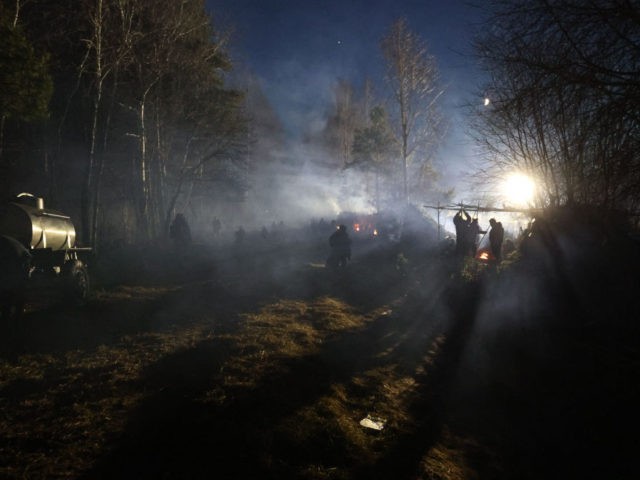The UK armed forces minister has called for the Poland border crisis to remain an EU issue and not develop into a NATO problem that would draw in the United Kingdom, calling it “very, very, very, very dangerous territory”.
James Heappey, British armed forces minister made the comments clearly distancing the UK from the possibility of coming to Poland’s — and ultimately the EU’s, as Poland’s eastern border is also the EU’s external frontier — aid at a defence conference just days after the NATO alliance pledged its support to Poland.
The minister said, in comments reported by the UK’s Daily Telegraph that “In principle and first of all it is a task of the European Union to protect its borders. The earlier the EU reacts, the better… The moment it becomes a military thing, you are in a very difficult direction. If this becomes principally a Nato issue, we’re in some very, very, very, very dangerous territory.”
Poland Says Border Migrants Using Children as Propaganda: ‘Take the Kids, Look Dirty and Tired’ https://t.co/yum7R3u3W6
— Breitbart London (@BreitbartLondon) November 9, 2021
Poland, as well as fellow EU members Latvia and Lithuania, has been under attack from Belarus for months, but the intensity of those “hybrid war” attacks on its territory has ramped up in the past week. Remarkable scenes at the border seen in footage released to the public by the Polish government reveal groups of hundreds of migrants marched to the border from within Belarus and apparently given equipment including wire cutters and axes to breach the frontier.
Belarus stands accused of being an active participant in this activity, purposefully flying migrants directly from countries like Afghanistan to its capital Minsk, before bussing them to the Polish border. This, the European Union claims, is a deliberate ploy to destabilise the bloc by cynically using refugees to advance Belarussian political goals.
Heappey’s comments distancing the United Kingdom — a NATO member — from the possibility of getting involved on the Polish border seem to directly contradict comments from the NATO alliance itself, a co-defence agreement founded on the principle that an attack on one is an attack on all. Reuters reported this week that following a closed-door briefing to NATO allies by the Polish government the alliance pledged support to the nation.
A NATO official quoted this week said of the developing border crisis that: “Nato stands ready to further assist our Allies, and maintain safety and security in the region.”
Belarus Training Afghans and Iraqis with Military Experience to Attack Polish Border, Claims Fmr Ambassador https://t.co/C59maPY6rm
— Breitbart London (@BreitbartLondon) November 11, 2021
NATO Secretary-General Jens Stoltenberg wrote this week that “[Belarus] using migrants as a hybrid tactic is unacceptable. [NATO] stands in solidarity with Poland and all our Allies in the region.”
Whatever happens, the potential consequences are high. Belarus is a small and relatively backwards authoritarian state, but Russia has made an increasing show of its support for the regime in Minsk, including air patrols by jet bombers. It also remains the case that, as a quasi-puppet state of Russia, the attacks against the EU may be directed from Moscow.
The worsening energy security picture in Europe also figures. Gas reserves, an important factor given Europe’s dwindling nuclear supply and the diminished impact of ‘renewables’ in the winter, are already low and a fifth of Europe’s gas travels from Russian drills through Belarus. Belarussian President Alexander Lukashenko has already threatened to turn the gas off this week if Europe doesn’t step down on its sanctions against the regime.
Polish police officers, border guards, and soldiers are trying to hold back thousands of migrants, some armed with wire-cutters, shovels, and axes being used to fell trees onto recently-installed protective fencing https://t.co/HS0LotGesI
— Breitbart London (@BreitbartLondon) November 8, 2021

COMMENTS
Please let us know if you're having issues with commenting.